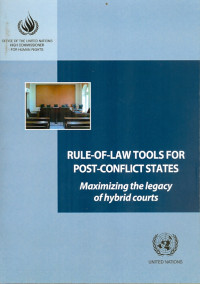
Text
Rule-of-law tools for post-conflict states
The Office of the United Nations High Commissioner for Human Rights (OHCHR) has increasingly recognized the need to enhance its assistance in United Nations-wide efforts to work quickly and effectively to re-establish the rule of law and the administration of justice in post-conflict missions. Countries emerging from conflict and crisis are vulnerable to weak or non-existent rule of law, inadequate law enforcement and justice administration capacity, and increased instances of human rights violations. This situation is often exacerbated by a lack of public confidence in State authorities and a shortage of resources. In 2003, OHCHR, as the United Nations focal point for coordinating system-wide attention for human rights, democracy and the rule of law, began to develop rule-of-law tools so as to ensure sustainable, long-term institutional capacity within United Nations missions and transitional administrations to respond to these demands. These rule-of-law tools will provide practical guidance to field missions and transitional administrations in critical transitional justice and rule of law-related areas. Each tool can stand on its own, but also fits into a coherent operational perspective. The tools are intended to outline the basic principles involved in: Mapping the Justice Sector, Prosecution Initiatives, Truth Commissions, Vetting and Monitoring Legal Systems. This publication sets out an operational framework for vetting and institutional reform and is intended to assist United Nations field staff in advising on approaches to addressing the challenges of institutional and personnel reform in post-conflict States through the creation of vetting processes that exclude from public institutions persons who lack integrity. The tool is divided into three majors sections: the concept of vetting in the context of institutional reform and transitional justice; the political conditions of post-conflict or post-authoritarian reform, identifying the sources of a personnel reform mandate, recommending priorities in transitional personnel reform, and proposing the development of a public consultation and information strategy; and the operational guidelines themselves.
Availability
| KP.III.00040 | KP.III IND r | My Library | Available |
Detail Information
- Series Title
-
-
- Call Number
-
KP.III IND r
- Publisher
- New York : United Nations., 2008
- Collation
-
vi, 34 hlm. ; 23 cm.
- Language
-
English
- ISBN/ISSN
-
-
- Classification
-
KP.III
- Content Type
-
-
- Media Type
-
-
- Carrier Type
-
-
- Edition
-
-
- Subject(s)
- Specific Detail Info
-
-
- Statement of Responsibility
-
-
Other version/related
No other version available
File Attachment
Comments
You must be logged in to post a comment
 Computer Science, Information & General Works
Computer Science, Information & General Works  Philosophy & Psychology
Philosophy & Psychology  Religion
Religion  Social Sciences
Social Sciences  Language
Language  Pure Science
Pure Science  Applied Sciences
Applied Sciences  Art & Recreation
Art & Recreation  Literature
Literature  History & Geography
History & Geography